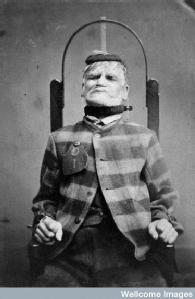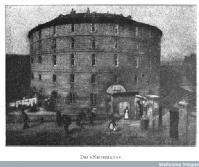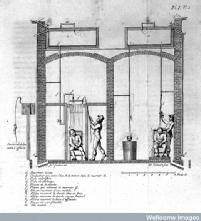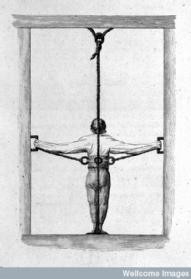Foucault's Great Confinement of the Insane
TOPIC 6 (Week 8): INTRODUCTION
Foucault is essential reading, and make sure that you read his commentators, supporters and detractors too. Everyone finds Foucault difficult to start with, but rewarding in the end even if his findings are disputable. Read as much as possible of Madness and Civilization, and think carefully about the questions below. This session also represents an opportunity to rethink what we have read and debated on confinement, asylums and moral management.
This week will follow a different format. Aside from exploring Foucault's work and using this to reflect on British asylums and processes of confinement, we will aim to organise a debate on Foucault's impact centred on the proposition: Foucault's Madness and Civilisation provides a valuable framework for re-thinking the history of mental disorder.
QUESTIONS
-
Does Madness and Civilization provide a framework for re-thinking the history of mental disorder?
-
How well does Foucault’s notion of a ‘great confinement’ reflect the reality of the asylum in England?
-
‘Custodial rather than curative’. Is this an accurate verdict on the institutionalisation of the insane during the 18th and 19th centuries? (think back to earlier seminars to help you answer this question).
READING
** Michel Foucault, Madness and Civilization: A History of Insanity in the Age of Reason (London: Tavistock, 1967) or read complete version in French, Histoire de la Folie (there are numerous edns of the English and French version) (available in paperback). e-book, multiple copies in library or purchase a copy, available 2nd hand for c.£5.
** Roy Porter, ‘Foucault’s Great Confinement’, in Arthur Still and Irving Velody (eds), Rewriting the History of Madness: Studies in Foucault’s Histoire de la folie (London and New York: Routledge, 1992), pp. 119-25. This article first appeared in History of the Human Sciences, 3 (1990), 47-54. e-journal
** H.C. Erik Midelfort, ‘Madness and Civilization in Early Modern Europe: A Reappraisal of Michel Foucault’, in Barbara C. Malament (ed.), After the Reformation: Essays in Honour of J.H. Hexter (Manchester University Press, 1980), pp. 247-65. Chapter scanned (course extracts HI383) and available via Talis Aspire
* Lawrence Stone, ‘Madness’, in Peter Burke (ed.), Critical Essays on Michel Foucault (Aldershot: Scholar Press, 1992).
* Roy Porter, ‘Madness and its Institutions’, in Andrew Wear (ed.), Medicine in Society (Cambridge University Press, 1992), pp. 277-301. e-book
Arthur Still and Irving Velody (eds), Rewriting the History of Madness: Studies in Foucault’s Histoire de la folie (London and New York: Routledge, 1992), esp. Colin Gordon, ‘Histoire de la Folie: An Unknown Book by Michel Foucault’. e-book
Colin Jones and Roy Porter (eds), Reassessing Foucault: Power, Medicine and the Body (London and New York: Routledge, 1994). e-book
Jan Goldstein (ed.), Foucault and the Writing of Medicine (Oxford: Blackwell, 1994).
Alan Peterson and Robin Bunton (eds), Foucault, Health and Medicine (London: Routledge, 1997). e-book
Essays in Outside the Walls of the Asylum and Insanity, Institutions and Society and Insanity, Institutions and Society. Several copies in library, e-books




